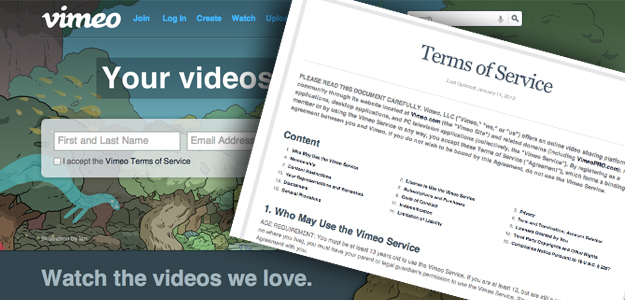
What are you really agreeing to when you click that fateful “agree” button? Terms & Conditions cuts out the legal lingo to spell it out in plain English.
For the average Internet user, the Web has but two video-hosting services worth using. The first, of course, is YouTube. The second is Vimeo, YouTube’s older (yes, older), better-looking, but less-popular cousin. The video player of choice for many an indie filmmaker, Vimeo announced earlier this month that it will now offer users full-length feature films through its new pay-per-view service. Six films are available now, with more set for release in 2013. So, just what are you agreeing to when you use Vimeo? Let’s take a look.
First, I must say that Vimeo’s terms are written in the plain-English style we like to see here at T&C. There’s some lawyerly mumbo jumbo in there – but the absolute minimum possible. In other words, if you actually took the time to read the roughly 3,000 words here, you would probably be able to understand what it says. (But we all know you’re not going to do that, anyway.)
Logging in means nothing
The first thing to know about Vimeo’s terms is that, regardless of whether you are a registered user or simply watching a Vimeo video embedded on some random website, Vimeo’s terms apply to you. The same goes for accessing Vimeo content on a mobile device.
This is the tricky thing about all embeddable content: You’re subject to the terms of whatever service’s embedded material, even though you don’t have a chance to review the terms prior to consuming that content. (This goes for YouTube/Google, too.) So just keep that in mind as you surf the Web.
Underage? Stop right there!
As with basically every website or Web service, Vimeo forbids children under the age of 13 from using its service, in accordance with the Children’s Online Privacy Protection Act. (Obviously, this law is ignored pretty regularly.) That said, Vimeo does allow users to upload content that parents might not want their children to see – nudity, graphic violence, etc – so parents, keep an eye out for Vimeo.com links in your child’s browser history; it might not be just another Justin Bieber music video.
Hot and bothered
Speaking of nudity… Unlike YouTube, Vimeo does allow for “non-sexual nudity,” i.e. not porn. Straight-up pornography, on the other hand, is still forbidden. So are acts of “extreme violence,” or any violence toward animals. Exploitation of minors and marketing “schemes” are also on the no-no list (we’re looking at you, Abercrombie & Fitch). Last but not least, anything that “violates any law” is forbidden, especially copyright law.
Deletion and refunds
Deleted accounts: Vimeo rightly allows users to delete their accounts at any time (unlike some other services). In fact, if you’re account is inactive for six months, Vimeo might just delete it for you. Vimeo might also delete your account if you violate the rules listed above. And if your account is deleted, all your videos will be deleted along with it, and Vimeo isn’t responsible for the loss of your content.
Refunds: Vimeo offers two levels of paid service: Plus and Pro. Plus accounts get their storage space boosted from 500MB up to 5GB. Pro users get 50GB of storage per week, plus a bunch of other perks. Both types of accounts cost money.
If you pay for an annual subscription to either type of account, you have 30 days to get a full refund. Monthly subscribers have just five days to get a refund. After that period, consider it money spent.
(Also, it should be noted that Pro accounts that are not renewed will be deleted 14 days after the end of the paid period. Plus accounts just become basic, free accounts after the paid period has ended.)
No copyright left behind
You’ve heard it once, you’ve heard it a thousand times: You may not upload content to Vimeo that you do not own. This includes video clips, photos, or music. Failure to do this may result in your account being deleted.
May I see your license?
By uploading a video to Vimeo and making it available to the public, you automatically grant Vimeo a “limited” license, which includes the ability to distribute your video around the Web, for third-party websites to embed the video, and for users to download the video. The license ends as soon as you remove the video from your Vimeo account.
However, Vimeo does not actually delete the video. While it no longer has the right to display it publicly, all videos are stored “for legal archival/preservation purposes.” And it might still be possible for people to find your video through a cached version through Google or other search engines.


